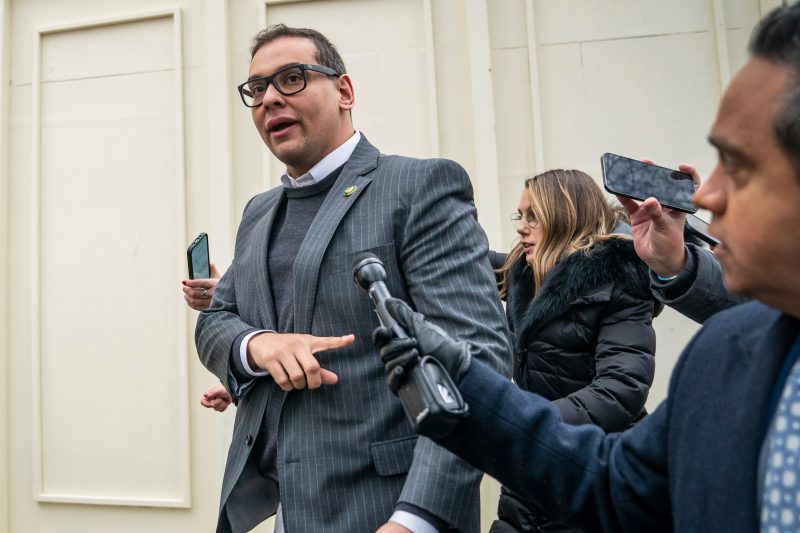In resisting calls to push out embattled Rep. George Santos (R-N.Y.), House Speaker Kevin McCarthy has insisted that it’s up to the voters.
Well, the voters have spoken, and they clearly want him out. In fact, they have expressed that preference by a rather historic margin.
A Newsday/Siena College poll finds that 78 percent of voters in Santos’s congressional district want him to resign.
This builds on a previous Siena poll last week which showed 59 percent of voters statewide calling for the resignation of the freshman congressman, whose myriad lies and legal liabilities have loomed over his extremely young tenure. (Even that poll suggested the numbers might be higher in his Long Island-based district; 71 percent in the New York City suburbs called for him to resign.)
The numbers from the new poll, specific to the 3rd Congressional District, are roundly brutal for Santos:
In addition to the 78 percent calling for him to resign, just 13 percent affirmatively say he shouldn’t resign. (Another 9 percent offered no opinion.)Members of Santos’s own Republican Party are about as likely to call for his resignation, doing so by 71-18 percent.Just 16 percent of all voters say Santos can be an effective member of Congress.Voters say 71-17 percent that McCarthy was wrong to seat Santos on committees. (The morning the poll was released, Santos said he would step down from those committees.)Republicans say 74-15 percent that Santos doesn’t reflect the values of the Republican Party.He trails by 21 points in a rematch with his 2022 Democratic opponent, Robert Zimmerman.
And it’s worth emphasizing just how rare it is to see this level of consensus that a politician should resign.
American politics have seen many scandals in recent years (it’s amazing some of the ones even a political reporter like myself can forget). And often, there are no polls testing voters’ attitudes about a given episode — either because nobody bothers to ask, or because the politician resigns before the situation festers long enough.
But among the scandals we could find polling on, Santos is in some exceedingly rare company.
His numbers come shy only of the 9 in 10 voters who wanted Illinois Gov. Rod Blagojevich (D) to resign in 2008 amid a corruption scandal that would later land him in prison.
The only comparable situations happen to involve New York politicians, but both struggled to reach Santos’s level. As many as 70 percent of New Yorkers wanted then-Gov. Eliot Spitzer (D) to resign in 2018, according to a Marist College poll. And Gov. Andrew M. Cuomo (D) also hit 70 percent in a Quinnipiac University poll in the summer of 2021.
There was also polling on South Carolina Gov. Mark Sanford (R) amid revelations of his 2009 extramarital affair, with one lower-quality poll pegging those calling for his resignation as high as 60 percent. (Sanford didn’t resign, but opted not to seek reelection; he was later elected to the House.)
But mostly, voters were split on Sanford, as they have been on the many other politicians embroiled in high-profile controversies — including senators Larry Craig (R-Idaho) and Al Franken (D-Minn.), and governors David Paterson (D-N.Y.), Jim McGreevey (D-N.J.) and Eric Greitens (R-Mo.). Comparatively small minorities of voters called for the resignations of senators John Ensign (R-Nev.) and David Vitter (R-La.) amid revelations about affairs.
Part of Santos’s problem is that he hasn’t had time to build a base of support that might have stood by him; his scandal touched off shortly after he was elected to office for the first time. Another part of the problem is that his district leans Democratic — meaning whatever base he might have built wasn’t going to be as large to begin with.
With these new indicators of Santos’s unpopularity, the situation for McCarthy becomes more complicated. He can say voters should decide the issue in the 2024 election, but this poll leaves little doubt that Santos’s constituents want him out before then. Polls aren’t perfect, but this is such a big margin that, even if it’s off by 10 points, it’s one of the most resounding majorities to call for a resignation this century.
Santos’s decision to step down from his committees, which came after he met with McCarthy, is surely an effort to show the party taking some action, and to take some heat off. But it’s acknowledgment that those involved don’t feel their previous posture was tenable any longer.
McCarthy will do everything in his power to prevent Santos from resigning, because he’s a crucial vote in narrowly divided House in which every vote matters, and a special election could easily hand the seat to Democrats.
But there’s always a breaking point. And Santos’s constituents have reached theirs.
Correction: This post initially misidentified Craig as fellow Idaho senator Mike Crapo.

